#this is just an ancient untranslatable language
Note
hi! i just found your blog and i cannot thank you enough for your translations. seriously, you're doing god's work for us history students lmao.
i wanted to know if you could somewhat translate the title of my midterm paper "the epic of gilgamesh: a study on sumerian mythology and writing" for my antique history class. my professor is a bit bonkers and gives bonuses for students who write in ancient languages (i have already learned a bit of ancient greek and i have been trying to learn cuneiform for his class, but the deadlines he sets are basically impossible to meet). i completely understand if it cannot be translated though, and thankfully it's not mandatory.
thank you so much for your time! have a nice day/evening :)
Hi there! That sounds so fun - and I would love to help, but this title is basically untranslatable in Sumerian for a couple reasons.
The first is that there isn't a word for "epic" in Sumerian, since it wasn't a category of writing they described; our words for forms of literature derive from later Greek, particularly from Aristotle. The Epic of Gilgamesh would have been referred to by its incipit, or first line. But this incipit (like the whole comprehensive epic) is in Akkadian, not Sumerian (it's Shūtur eli sharrī, "Surpassing all other kings"). The Sumerians only wrote independent stories about Gilgamesh, some of which were then consolidated into the Akkadian version(s) we know today, so there's also no word for Epic of Gilgamesh in Sumerian.
The other problem comes with the word "mythology", also a concept we derive from Ancient Greek (μῦθος). The Sumerians didn't conceive of themselves as having mythology, since to them it was religion, or just the truth. They also don't have a clear word for the concept of "story" or "tale" - we have a lot of Sumerian stories, but not documents of Sumerians talking about their stories as such. There's also no great match for "study" as a noun, beyond maybe ningzu 𒃻𒍪 "knowledge, learning" - so ningzumashdaraEmegira "learning of Sumerian-language inscription(s)" is the closest I can get.
Thank you for the kind words, and enjoy your antique history class! May it bring you much fascinating ningzu ^__^
65 notes
·
View notes
Text
the multilinguality of a lot of the witcher characters is something i love and also probably a feature resulting from sapkowski being a polyglot himself as well as creating a fantasy world that mimics the real one.
it’s a more obvious and crucial element in the hussite trilogy, but i think that it’s also significant in the witcher, too.
languages are not as simple as belonging to one people group. for instance, one can know one dialect of elder speech and be fluent in it, but struggle to communicate in another dialect.
there’s various dialects of elder speech, the first being the classical, the one spoken by elves. another one is nilfgaardian. another one is skellige jargon. another one is brokilonian… and there is an entire variant of elder speech used by mer-people and sea creatures, but it is sung, with one’s musicality, melody, and intonation affecting their accent.
and elder speech is needed for specific activities. if you cast spells? if you’re a human, you need to know classical elder speech, because the human way of casting spells requires incantations and hand gestures.
if that wasn’t enough, the concept of languages dying out and intermingling and evolving is also touched on.
for instance, the dwarvish language exists, but is quickly being forgotten as assimilation into human settlements becomes more and more common, and youngsters are reluctant to speak their own language
another example of time and the mixing of groups affecting the evolution of language is in the north case, a mountainous region in which nilfgaardian and northern tongues have been mixing for the past couple of decades due to imperialism and nilfgaardian expansion northward. and owing to this is an eruption of new slang using words from nilfgaardian has entered the local tongue.
(this part is just a headcanon:) there’s probably a lot of local languages and dialects, from regions the nilfgaardian empire consumed, that are various stages of dying because some places were conquered hundreds of years ago and some were conquered only a few decades ago
there’s even more obscure languages like the vampire language which is only known to us in a nauseatingly menacing, terror-inducing song and… an untranslatable pun.
what’s more is the curious use of latin words and phrases used as one mught use them today; for which, of course, the out-of-universe explanation is that sapkowski is addicted to using latin, but, in-universe is an ancient language with a similar role latin has in modern society being “translated” to our latin, just like the common tongue is being “translated” to polish.
and what i love the most about this is that this isn’t knowledge that lives in the background, not touching the lives of our characters. the characters’ abilities (or inabilities) to speak languages affects them in many ways throughout the story.
geralt speaks elder, but his brokilonian dialect is poor (at least during sword of destiny, in time of contempt he seems to have improved somewhat during his month-long stay)… and dandelion had to learn elder speech for his expedition to brokilon, to sing elaine ettariel and speak with the dryads, and you can see that he’s a beginner in the language.
milva gains multiple nicknames in elder from the elves owing to her service to them, not solely out of respect, but because her given name is hard to pronounce for them. and her present nickname, the one she should be proud of, is not of any of her attributes, but a familial title—sor’ca, sister.
another thing about milva is that she is illiterate, but at the same time, bilingual. one does not preclude the other!
cahir’s mother language is nilfgaardian, but speaks the northern common language because of his northern ancestry on his mother’s side. and in times of stress, his mind blanked on northern, as well as when he swore in nilfgaardian.
cahir can understand angoulême’s north case slang, as well as “translate” for the rest of the company, but they have probably run into confusion or frustration—“how did you get that from that?!”
and regis’ language is so obscure, he makes a joke in it to himself and no one else understands, but he still is clearly amused by it. and vampires seemingly also do not speak with their mouths, only using telepathy, so the acquisition of human language must have been a challenge for him. and i wonder how many human languages he’s learned only to later face their extinction. perhaps when he came back from the grave, the human language he had learned was now defunct, or rarely used?
#my favorite thing is when yennefer and triss are trying to cast alzur’s thunder and they’re ‘squeaking’ frightenedly#and it’s said that alzur had a voice like a bell and here we are squeaking and muttering and messing it all up#i love how they were both terrified then#the witcher books#txt
61 notes
·
View notes
Text
My favorite fact in the entire world is that language forms the thought, and the language you speak change the way you think. That's why there are untranslatable words, because we do not have the concepts necessary to think about them. Just do the thought experiment of trying to explain what furry porn is to an ancient greek, and you'll see that there are many concepts and ideas only available to us.
2 notes
·
View notes
Text

stealing my banner from my other blog because fuck it I might as well. detailed headcanon on Isshu, ancient unovan history (nothing that could be construed as modern, literally just up to the Heroes of Truth and Ideals), and the surviving culture.
All of this is written AS IS KNOWN BY MODERN DAY HISTORIANS. This is largely why I am writing it on this blog instead of Adair's; lots of names are omitted because those have been lost, it's incomplete and in places not actually wholly accurate to the slightly more detailed version of canon that would be found over on @fusionbolts. I also have a lot of links embedded to other headcanons. So lets get into it.
The Foundation of Isshu
While the vast majority of Isshu's history is forgotten to time, there are a few oral traditions and folktales that have persisted, one of which being the most foundational to their culture: the founding of Isshu and Isshurem's pact with humankind. As expected, the details of the tale are somewhat fuzzy, being literal centuries old, but the core of it remains fundamentally the same:
In the distant past, there was a time when the differences between humans and pokemon seemed impossible to bridge; they lived entirely separate from each other and fought often. At this time there lived a young boy who was born with a gift that allowed him to speak with pokémon. This boy, who walked freely between the worlds of human and pokémon, sought out the Great Dragon, arbiter of balance, to help him bring about peace between their kinds. They forged a pact, that human and pokemon kind would walk side by side forevermore.
At least, that's the general gist of it. (A longer version of it exists on one of my older blogs, if you're so inclined. Fair warning I wrote it like five years ago. Probably more.)
This foundation myth is fundamental to Isshu's spiritual beliefs and their relationship to pokémon, information which can be found here. However, Isshurem has always been core to its belief system as the nation's sort of guardian deity, with the name "Isshurem" itself literally meaning Guardian of Isshu. In the old days, leadership of the nation meant being Isshurem's partner.
The Golden Age
Very little is known in detail about the golden age of Isshu Culture as much of it was destroyed, lost to time, untranslatable until very recently, etc. Part of it is the result of Unova's very tumultuous history and the eventual fall of Isshu, and part of it is just due to the fact that it's a very, very old culture and a lot of their written history fell victim to time. BUT,
The Golden Age of Isshu was, as the name would imply, the height of their civilization, but historically speaking—virtually none of it still remains. The only structures still standing from the Golden Age are the League Building and Dragonspiral Tower. Historians who have been able to study the few remaining writings from the era have also managed to learn something about "seals", a form of ancient "technology" developed by the people of Isshu that made their quality of life quite remarkable by ancient standards. It's also what gave us Golett and Golurk! Nobody knows how, though. The Golett that exist are... all of them. Ever. The art itself has been lost, but remnants of it remain in modern Isshu art and traditional crafts.
The original written language of Isshu has also largely been lost—or so it was thought until the Abyssal ruins were uncovered and translated, allowing them to serve as a sort of Rosetta Stone for the original alphabet. The modern version still follows many of the same grammatical rules (and uses the same pronoun system!), but beyond that, there's little resemblance.
In short: little is known about Ancient Isshu, but it was believed their civilization was highly advanced for the time. They were, perhaps because of their advanced technology, or perhaps due to their distance from many other regions, an extremely isolationist culture and did not have much exchange, cultural or otherwise, with the other large civilizations at the time. That was, until...
The Fall of Isshu
Short version: colonialism happened.
The long version: Paldea, Kalos, and Galar sometimes just got done fighting a real big war and somebody (we won't name names) set off a superweapon and just decimated both armies entirely.
Wars are very expensive and this was a large problem for everybody, so with this on top of it, two of those countries came out pretty broke and the third was having its own problems with a giant space worm and some dogs. It was a bad time! The solution? INVADE SOME OTHER COUNTRIES ABOUT IT!
Again, this is a particular part of history that is not especially well-documented from the Isshu/Unova side of things. Historians know that Isshu's rather limited military force was not prepared for the attacks, which made them a pretty easy target. We also know the then-sovereign of Isshu was killed in the ensuing conflict, and the original dragon was presumably quite badly wounded, which ultimately led to Isshu's utter defeat at the hands of invading foreign forces. (It is believed that the Abyssal Ruins, dating back to that general era, are a tomb or memorial for the last King.)
This is the period in which most of Isshu culture was lost. Either it was taken by foreign forces (which is why we have Golett outside of Unova!) or destroyed utterly. For the next two centuries, much of the remnants of these people lived in the northern, mountainous regions of their country, where they could live more or less in peace. At this point, the Village of Dragons becomes the last bastion of Isshu civilization, and remains that way for... pretty much the rest of their history.
The Isshu people were not treated well during this time, as tends to happen with colonialism. I will not go into heavy detail as I think we can all fill in the gaps as to what that means, but it wasn't a great scene. (Slightly further detail on all of that and the leadup to the Unovan Revolution can be found here.)
In the meantime, the three major countries that had done that colonialism and also had done a war with each other right before... started fighting again. Shocking. It was less of a full-on war and more infrequent, but definitely regular territorial squabbles that, unfortunately, the remaining Isshu got dragged into. So you know what that means!
The Unovan Revolution / Foundation of Unova
Two brothers and a dragon do a revolution! Again, this is not an especially well documented period of history, but it is heavily mythologized thanks to it being the precursor to Reshiram and Zekrom. The short version is a couple of guys found Isshurem, who most people thought was dead, and it helped them do a revolution. (The full story is much more complicated than that, but you get the idea.)
As you can imagine, this was incredibly important. Arguably, the foundation of Unova was the only thing that allowed Isshu culture to survive in any form during the modern day. But it wasn't without its problems. As with any colonial state, people were, uh, having some complex feelings about who rightfully belonged there and who didn't, the direction of this new country, etc. etc., which would inevitably create a schism between the two brothers who started the revolution, and... Well, we know the story from there. Three dragons!
The ensuing conflict(s) and family drama would drive the then-kings to their deaths and leave the dragons stuck in rocks for a few millennium while the new Unova got to mythologize them.
There is reason to believe that while the Heroes of Truth and Ideals were both in agreement of trying to restore and preserve Isshu culture (generally accepted as being the culture they came from), their successor let it languish for unknown reasons, presumably political. (Ironically, it's pretty well known that their successor was the progenitor of the Harmonia royal line... Harmonia being an Isshu name.)
Modern Isshu Culture
As to be expected, there are still remnants of Isshu's culture and people within Unova, particularly in the northeast. While it's been through some extremely tumultuous times, even after Unova's founding, there have been some troubles with homogenization. But, nevertheless, there remains a handful of people who consider themselves Isshu and keep a few key cultural practices (copy and pasted from another headcanon, you're welcome):
1. Isshu do not (traditionally) use pokéballs. Tradition is to find and befriend a partner pokémon without catching them. Now, mind you, in the modern day and age, this isn't always practical, so some would opt to capture a pokémon after formally befriending them, particularly if their partner was especially large, dangerous, etc. However, a partner pokémon is typically kept outside of their pokéball as much as possible.
2. Isshu do not eat farm-raised meat, but wild-caught meat is acceptable. Again, practically speaking, this is somewhat difficult in the modern day: that accounts for, y'know, most meat products. Depending on where they live, many Isshu are effectively vegetarian or pescatarian. (The rules regarding animal byproduct, like in gelatin, are a little loosey goosey, but it's generally regarded as fine: ultimately, it abides by another core principle of Isshu culture, which is to respect the body of what you hunt/kill as to not let it go to waste. What isn't used should be returned to where it was found and returned to nature.)
3. Though far from a hard rule by any means, Isshu marriage tradition dictates that the couple exchange emblems of their partner pokémon when engaged, so the couple is symbolically always together. It's all very cute.
4. The major cultural holidays take place on the summer and winter solstices, with the latter being the cultural new year, much like how other cultures recognize a lunar new year. Minor holidays are on the equinoxes.
5. Again, this is far from a hard rule, but music is a very important component of Isshu culture. Many of their core mores and norms are born from concepts that are, culturally and linguistically, tied very HEAVILY to music. As such, it's extremely common for Isshu children to learn how to play an instrument.
#hit the books ★ { headcanon. }#alright here it is#it's not especially detailed but it is the tldr version#there are a lot more fuckin complicated thigns i could get into with relation to Why isshu culture got squashed by poke-europe but like#we can figure it out right.#it was far from an incredibly socially equal culture but its social heirarchy did have ppl who were traditionally oppressed in -#- poke-europe like aura users and psychics at the Top
2 notes
·
View notes
Text

My first full-length poetry collection, Toska is out now from Deep Vellum! The gorgeous cover art is by Katy Horan.
You can find it at the following places:
Deep Vellum
Bookshop.org
City Lights
Open Books
Barnes & Noble
Target
Amazon
your favorite local bookstore, if you ask!
If you’d like an inscribed copy, please get in touch with me here.
These are poems about the untranslatable but essential concepts that form us, and Alina Pleskova is the interpreter of their simultaneous hold and flight: “What you call me in the dark / isn’t what I am / & that helps me float / above the moment.” Toska is a book of the immigrant daughter in her not-quite-own world, and a book of contempt for striving and capitalism—but the centripetal force that powers these poems is the nameless part of the self, “ruthlessly / down for whatever,” the locked room that nobody can open even while you long for a breach. Pleskova, generous and funny and modern, is a poet of forthright intimacy. —NIINA POLLARI, author of Path of Totality
Alina Pleskova’s debut collection is into grabbing things by the neck, & not always gently: eros in the ancient bedroom & the age of apps; transcendence & complacency & spirituality under capitalism. Pleskova’s poetics is deliciously generous, even in its moments of ambivalence; reading Toska is like chatting with your best friend about pursuing & evading pleasure while the American project unravels. These poems don’t just see to the heart of queer & immigrant subjectivities; they enact them. I sank with this book, was buoyed by this book—how it, like so many of us in America, experiences perpetual attempt, failed translation, the feeling that we are always missing something just beyond our reach. If only we could tighten our grip, want wanting itself, we might unearth language for identity & desire language, of course, being ephemeral, timeless, fleeting, & stunning, all at once. —RAENA SHIRALI, author of summonings and GILT
Alina Pleskova's Toska bears the burden of the eponymous longing melancholy of living even as it phases into the burn of real threats to human-and humane-existence. Writing from "The country where I live- / its surveillance of us surveilled by the country I'm from-" she counterpoints the impersonal gaze of the state and algorithms that follow our movements with the poet's infinitely careful attention to the flow of the everyday: "Made it this far / without mentioning the rain. // Here it is; it's perfect." Solace is found in community, the imperative to "Daydream what mutual care could do," the vast motions astrology tracks, ancient poet gossip. Overwhelmingly, too, in the mysteries of queer desire and its dream of transcendence, the desire to desire unbounded by intolerance, or worse-murder. These poems telegraph in a seductive whisper that keeping each other alive is enough-it's everything, because "I want the class wars to start, but everyone's so tired." The poet asks, "What song was playing when my heart's chambers I got thrown open to let these breezes in?" This book is the song, its frequencies coming through the voices of friends, lovers, family, the poets of the past, and Pleskova's tender plaint that would "Mourn the redwoods, fireflies, platypuses, permafrost, all else that deserves to outlive us & won't ..." In her hands, poetry is the hack for our earthly hangover, toska / saudade its secret sauce in whose ingredients hide the seeds of a new world. We'll be together there,' "covered in each other's hair." —ANA BOZICEVIC, author of New Life
Reading Toska was a spiritual and whole-body experience. I laughed, I screamed, I teared up, I nearly bought a one-way ticket back to Moldova, I called my mom. No one captures the poetics of eros and diasporic longing amid our late-stage capitalist hellscape like Alina Pleskova. 'Assuring various robots / that I'm not a robot several times daily' does not prevent our speaker from 'stockpil[ing] intimacies almost too ephemeral to clock.' And what a gift this book of intimacies is. Toska is a tender and wry instruction manual for navigating desire and the void. I will follow Alina Pleskova anywhere. —RUTH MADIEVSKY, author of All-Night Pharmacy
7 notes
·
View notes
Text
But Sunburst only shamefully looked away, and uttered not a word, for though he greatly appreciated Light's reassurance, and he desperately wanted to tell somebody about what he experienced, not just at the hooves of others, but also his own, he knew here was not the time nor place; and as a pained smile grew upon his face, his eyes welled up with tears, and he asked Light to talk about it later.
With an slow and understanding nod, Light agreed, and turned back to the book and the letter before them, wherein they hoped to find something, anything that could tell them about the identity of the sender, or why they wrote to Light, and what they wanted them to know; for if what they spoke about was crucial, it was unwise of them to write it in a language ancient to even the eldest and wisest.
But although their mind was focused on other matters, and they knew it had already taken a terribly long time to find but a few small fragments of an answer, for a reason they could not explain, they had a feeling they would make good progress today; even if what they found could be ill news, given that the letter had caused them and others great pain, they would be able to put this matter aside.
Still, as they flipped through the pages of the collection of letters on the table, Light made sure to keep an eye on Sunburst, and they cared not about whether he noticed their glances, if he did so at all; and shortly after, the table was covered with a myriad of pieces of paper, comparing almost every single word in Light's letter to similar words they discovered in the book of correspondence.
Some words, they found, although few in number, were written multiple times, yet none of these ever appeared in any of the letters from aeons ago, which held similar, untranslatable words themselves; and as both Light and Sunburst thought this was unusual, they made sure to make a note of all these words, for they may find a translation elsewhere, and if not, they could ask one of the Princesses.
It was at that moment that they realised what a cluttered mess they had caused, as the table looked worse than a moment ago, when multiple shelves worth of books and paper laid scattered around them; and Light suggested to Sunburst to sort the notes they had first, as they started to make a pile of the notes they made, when Sunburst turned to Light with a spark in his eye, and asked them to wait.
The confused Kirin did not move as the Young Wizard got up from his seat and started to walk around the table enthusiastically, speaking in a genuinely excited voice about the countless ways to order a stack of papers; and as Sunburst leaned over the table to grab the stack of paper from Light, his smile brightened, and he started chattering away about all his favourite ways to sort and organise.
From size to colour, alphabetically to how many pages it had in total, Sunburst was in his element, and Light could tell, for not often before had they seen such energy and passion from any Pony; but now, seeing it in Sunburst, Light could not help but smile at the great change in demeanour for the Young Wizard, whom they were following through the Archives, as he sorted everything they put back.
To their surprise, Light struggled to keep up with Sunburst both physically and emotionally, as the Unicorn in front of them constantly trotted around while explaining everything, down to the tiniest detail; but Light hoped that listening to Sunburst helped to keep his mind off of matters they knew were rough, even if they did not know half of the words he was saying, and struggled with the rest.
Regardless, Light cared more about the well-being of Sunburst than their own exhaustion, since this was something they were still learning to avoid, and they let out a deep sigh; but when they did, a shiver ran down Sunburst's spine, and as Light noticed his enthusiasm drop, he took a seat, wearing an all too familiar, heartbreaking expression upon his face, about which Light worriedly asked him.
But Sunburst only sighed in turn, trying to steady his breath, and told them:
"I know you did not mean it… but it still hurt…"
(Thanks for reading! And if you enjoyed, please reblog! Thanks in advance!)
Send an ask or request! | Start at the beginning! | Next part!
4 notes
·
View notes
Text
ToTK Art book part 4
Parts 1-3 here
Spoilers for: Zonai things
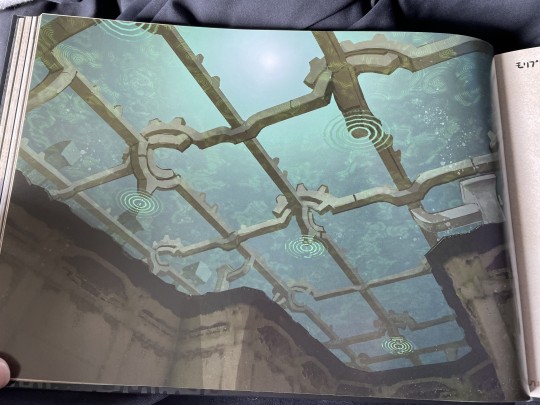
Page 56, full page art of newhrine ceiling maybe? It definitely has the same general vibe as the shrine ceilings, but new!
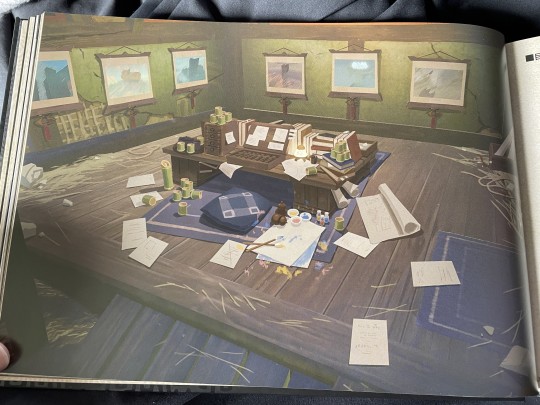
Page 58, more full page art of an unknown sketch room. Unfortunately all the full page arts have no titles or developer / artist notes, so we have no context for any of them. The pictures on the wall have eyes at the bottom of them so my best guess is this is Sheikah related.
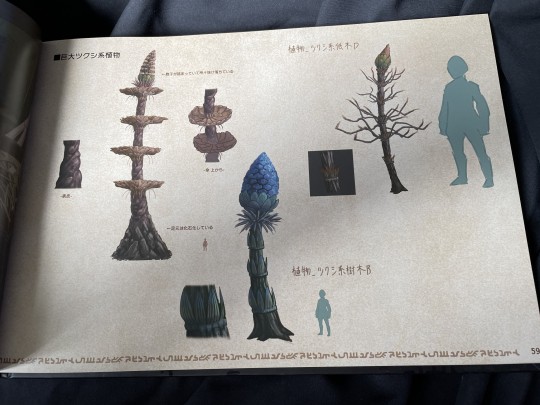
Now this is interesting. Page 59 has art of a "Giant horsetail plant" and we can see 3 pictures of link compared to it's growth stages. On the far right we have the smallest plant, bottom middle has the medium height, and the left has the biggest possible plant, with a very tiny link for comparison.
Wow. I'd love to see the places this is in, the medium ones alone seem to be taller than most average trees from botw, so the large ones are only dwarfed by the deku tree. It even has a note that the bottom of the tallest height has the bottom roots fossilized, that's how old they are.
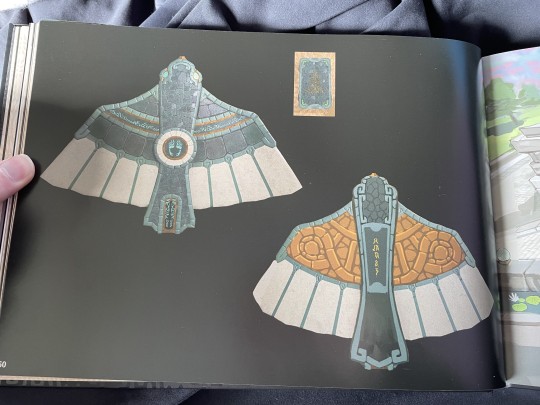
Page 60 gives us a better look at the top and bottom of the bird glider from trailer #1. It's got Zonai on the underbelly, but that's still untranslatable for now.
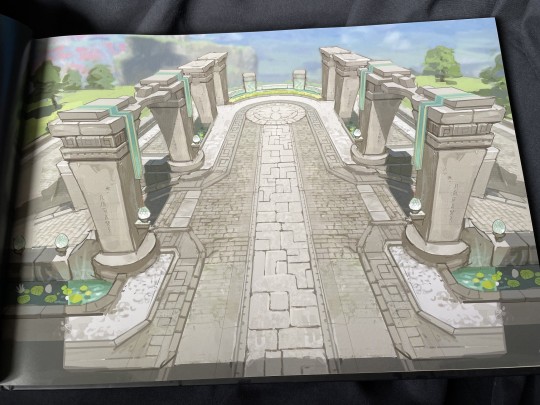
Page 61 has full page art of some overworld Zonai structures (as opposed to underground or on sky islands). Zonai defined by the folded up lotus flowers we've seen on other tech like the Automaton and by the Zonai language on the pillars.
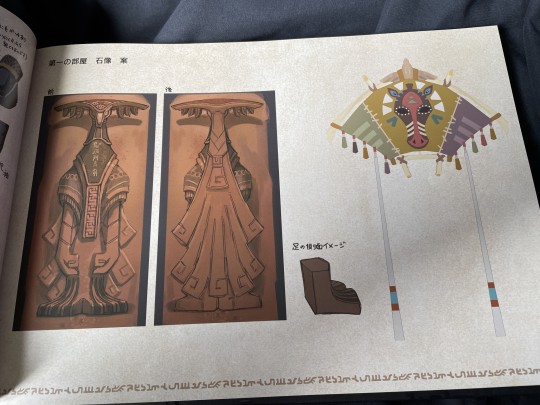
This page, page 67, has depictions of the same God we saw in the trailer mural holding hands with who we assume is Zelda. The same mural was seen in better quality back on page 26. Now I wish I'd pointed this out sooner but hindsight is 20/20 and everytime I look through the art book I notice something new (and j can no longer edit parts 1 & 2) but all Zonai related stuff heavily contains 3rd eye artwork. Their automatons, their armor, and now this statue clearly has a 3rd eye ontop it's head. Very interesting and we'll come back to this concept later as it reoccurres.
Assuming this statute is depicting some sort of ancient Zonai god(dess), it's interesting that this page outs together two forgotten gods. This statue, and the forgotten horse god.
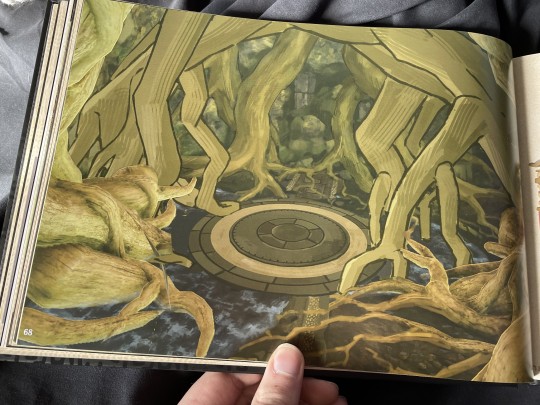
Page 68 has full page art of a room covered in roots. That's about all I can say for this, but I do want to include all the full art so it gets at least some recognition and appreciation.
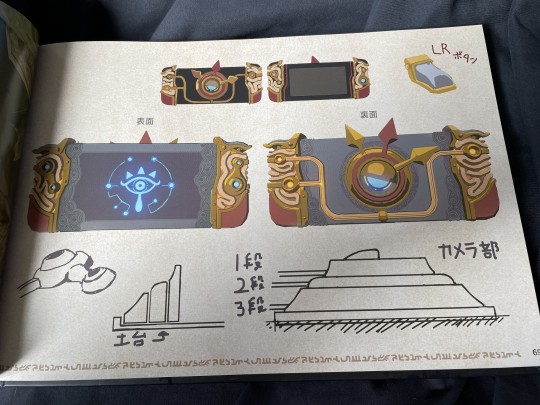
Page 70 shows us the redesigned Sheikah Slate, now more modeled after the switch. We see it's got ZR and ZL buttons now, and they back has been redesigned to have an eye that functions as a camera. The front has lights that roughly line up with the joysticks and d-pads of the switch, further reinforcing where it got it's inspiration from.
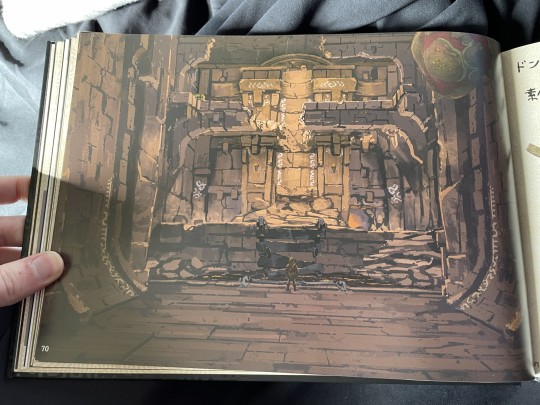
Page 70 is more ruin art, with some sort of writing on the walls. Honestly, we may be dealing with two different languages in this game, as the "sky writing" we've seen in the circular logos has 14 distinct symbols in, and these letters that have occurred elsewhere (including the trim on the pages in this art book) is more blocky and uniform. I think currently people are grouping them together, but they don't fit together in my mind.
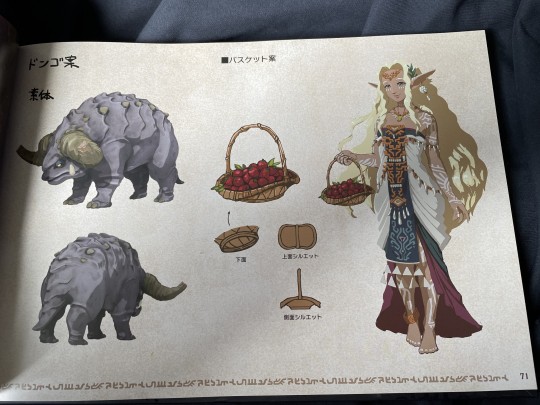
Last picture for this part, page 72 has a nice character and a new creature. What I'm more interested in is this new character's design - white markings that are remisinse of Zonai art, the same dress parreren we've seen before in other Zonai stuff, and a headpiece with a third eye-esk design. I've already mentioned how much Zonai stuff related to the idea of a 3rd eye, but here we see them all together - this person is part of the Zonai!
This is one of the more interesting parts of the book, as we get to know (to some degree) just who the Zonai are. There's more to come but so far, this is the most we've been given on the Zonai people.
5 notes
·
View notes
Text
I wonder if part of the theme for this update could be related to archeology/ancient ruins in general.
Heres is how the official minecraft account described the update:
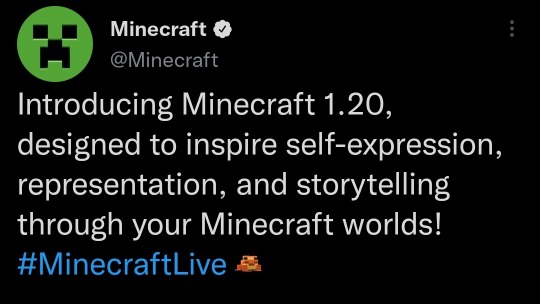
Storytelling you say? Could you perhaps mean in the way of people coming up with stories for the ancient items they dig up?
Similar to one of the concepts first shown when archeology was proposed? Where we were shown that you would dig up fragments of clay pots with designs on them (one example being the ender dragon) and could assemble them however you wanted to make your own story?
Along with functional bookcases being added? ... okay well I don't think mojang would add solid written lore in ancient ruins to minecraft, that would go against the whole "self-expression" part.
BUT! Maybe in ruins we could find untranslatable books, written in the same mysterious language as enchantment books are. (The words geniunly not translating and just being nonsense, even tho galactic is a 1:1 of the English alphabet. Pretty sure the same is true with the words seen when enchanting but ive never actually checked.)
Plus! The sniffer won. It would fit in perfectly with an update themed around archeology and other ancient ruin-y things.
"What if the sniffer hadn't won? What if it was one of the other mobs? It wouldnt fit the update!"
Well I feel how the tuff golem could work in ancient ruins is pretty obvious, with its whole thing being a walking item frame that also looks like a statue.
And for the rascal, one of its possible rewards could have been like, maps to places where you could find ruins or fossils or something. Like how you can get buried treasure maps from underwater chests and guardian/mansion maps from villagers.
Obviously, I could be wrong. A lot of what I'm saying doesn't quite fit the 'self-expression and representation' parts of the updates description. But like, I think I might be onto something.
And if I'm not? I'll be mildly disappointed, but it will be on me for theorizing, not on mojang for not delivering on stuff they never promised
... for this update. They've said archeology will be coming eventually. And so far 1/4 of the biome vote losers has actually made it to their 'eventually', so there's proof they have in fact not forgotten about their other 'eventually's.
17 notes
·
View notes
Note
hi maman! even though you’re a native french speaker, what’s something that frustrates you or was/is difficult to learn about french? do you speak any other languages other that french and english?
Hello dear,
I had a hard time getting my head around the nature of words (mostly objects and pronouns) and grammar rules because I started reading when I was very young, so I instinctively knew how to spell or conjugate - but I couldn't explain my reasoning to my teachers outside of "it's just the way it is".
I have been in and witnessed arguments over the spelling or gender of certain words, until someone googled it and realised the French Academy had meddled with the rules so both versions were now fine.
Culturally, the whole Tu/Vous thing and manners (i.e. how to phrase things to sound confident and assertive but not rude, how to talk to strangers depending on gender, age, and social class...) are essential but burdening.
In university, I had a few classist professors who were against language evolution. We were scolded for using words in the context of their new definition, or newly invented words, because it wasn't proper. For example, Sympathique used to mean compassionate but turned into friendly. I heard that one medieval specialist rage and point out the etymology at least a dozen times.
Since becoming fluent in English (if I can say that), conversations have been more taxing because many concepts exist in one language but not the other, thus are untranslatable. Coming up with a translation on the spot is hard.
Things I witnessed:
Not knowing when a verb is regular or not. I have a vivid memory of unleashing hell after hearing my grandmother say "Je buverais bien quelque chose" and correcting her because no one believed me. The subjunctive mood is also not a crowd's favourite as it can be irregular and sound wrong.
Not knowing the difference between homophones. Stuff like C'est/S'est/Ces/Ses. Children will pick one and hope for the best.
Not knowing how to conjugate. Many conjugations sound exactly the same.
Your region will determine the way you pronounce things. I discovered a few years ago that when I mention the colour pink, I sound southern. My family has been living in the same town in the North since at least the 1500s.
Things like Comme même/Quand même. I attribute this type of issue to routinely hearing the word without ever seeing it written AND having a family who makes the same mistake and doesn't encourage reading.
I'm semi-fluent in English, rusty in Spanish (high school level neglected since I graduated) and A2 in Italian. È ancora un po' difficile al momento, ma sono contenta dei miei progressi! Being French makes it easier, I'm mostly lacking vocabulary but I should be fluent by the end of the year. I also know a fair amount of Latin and Ancient Greek because of my degree, a bit of Russian, a crumb of Polish, can semi-decipher Portuguese, and I'll be learning German in 2023.
Hope this helps! x
52 notes
·
View notes
Note
Honestly, weird little gripe I have, but the aliens in Mass effect have translates right? But the animations sync up with English, so I'm hella curious as to what they actually sound like and look like when speaking tbh. Personally I think krogan bellow like frogs buts just me
Ugh, translators, OP you are so right, the more you think about them the less sense they make for canon and the in-game experience. I definitely understand the need to just simplify things and not commit to an alien language that is then subtitled for the player just to maintain the illusion that not everyone is just walking around speaking English. But I personally appreciate when media goes out of its way to demonstrate linguistic multiculturalism--it makes the world feel so much bigger and any game featuring aliens would benefit from that kind of world-building.
In the books and the updated Bring Down the Sky codex update, there's mention of a simplified galactic trade tongue. I don't think this is what all the squadmates are using though, because I'd think it would be a bit limited for the breadth of communication used in the game. It's considered 'broad-minded and practical' to be able to speak without machine aid' so while Earth is linguistically divided, I do think that quite a few squadmates are good polyglot candidates. Liara, for one. Despite being anti-social, I see her studying all sorts of languages and probably picking up major Earth languages in her spare time just for the novelty and fun of it. I headcanon that for asari at least, the appearance of a bunch of new Earth languages spurred a whole trend of Earthophilia--everyone rushing to compare their proficiency in the various common languages. Samara (for the same reason), Mordin, Wrex (he's an experienced merc and he's ancient, I could totally see him teaming up and learning languages from humans just to know more unique insults to hurl at turians and salarians). Despite the 'translator glitch' comment from Shepard--even Thane for the same business practical reasons as Wrex? I have to think having an amazing memory would make picking up languages really easy.
I think, despite his anatomical incompatibility with labial sounds, Garrus would be another polyglot--although probably less proficient than Liara. For one, turians had a military incentive to learn major Alliance languages during the First Contact War and they probably pioneered the initial translation effort. For another, he lives on the Citadel and his father works at C-Sec. I see the Citadel education system, whatever it is, highly emphasizing alien language development. It would be hugely advantageous for him to speak without translator aid to suspects and witnesses when he works at C-Sec.
I also like to headcanon that Garrus is such a nuisance to Pallin, that by way of punishment and to sandbag his hothead tendencies, Pallin shoves him with every single human rookie to join the force and so Garrus has managed to pick up more human languages, turns of phrase, and gestures/facial expressions than most--even using them himself.
So, it could be that Garrus is speaking an approximate variant of Shepard's native tongue and her translator is smoothing out all the missing m's p's and b's. Or maybe having the double syrinx (birds have syrinxes so that's what I think of instead of larynx) can 'fake' it pretty well. Either way, looking visually indistinct. I do like the headcanons I've seen where turian language meaning is highly pitch based with the subvocalizations conveying a lot of meaning, unbeknownst to the human ear.
In the books, Omega is described as not employing any of the common trade tongue and being full of a ton of different untranslatable dialects that sound like a cacophony of squawks and grunts so the alien languages are definitely alien--we just sadly never get to hear them :( EVEN on Omega, how dare they. I love the idea that krogans bellow--they absolutely should! I also love most of the native turian language headcanons I've come across, the fandom has some really creative concepts out there!
So in short, I think there is a headcanon that can fit with the game's animations--it's fun to me to think of Liara and Wrex busting out Mandarin every so often. But let's hope the next game gives us more linguistic diversity!
#mass effect#mass effect meta#garrus vakarian#liara t'soni#answered asks#Sorry this was so delayed!#AND SO LONG
84 notes
·
View notes
Text
The importance of legitimacy of Shinto clergy and shrines
Date of posting: Saturday, April 10th, 2021
By: Rev. Olivia Bernkastel
Hello everyone! It's been a long time since I've posted an article of mine. It's been a very difficult time, especially with COVID-19, and I hope everyone has been keeping safe and healthy.
This is a topic I felt was too important to not write about, especially that it has come to the attention of other Shinto clergy online and myself, that a number of illegitimate shrines and individuals claiming to be priests or Miko with no authority to be doing so have come up in the past few months, and I don't want people to be misled.
I have compiled a list of legitimate Shinto and Shinto-related presences overseas here, so please see here: https://www.livingwithkami.com/shrines
I want to write about this topic a little so the reason of why it is so important can be understood.
I am not sure why the above issues occur so often personally; but in my time online I feel this stems from various issues.
A main issue I have noticed is that Shinto is often equated with, or regarded as under a type of Paganism, and this is a misnomer.
Shinto a living, unbroken way of living and tradition that has existed since ancient times in Japan and never died out.
Pagan religions are those that have existed since ancient times, but at some point the tradition, knowledge, and organization of such religions were lost to time.
There are some groups that try to re-establish these ways with revivals, but it is not the same as a living tradition, especially not the same as a living tradition tied deeply and inseparably to Japan and Japanese culture.
In Pagan spheres, anyone can claim to be a priest and set a shrine/temple because there has been no formal continued living tradition, organization, schools, or authorities (such as licensed clergy or elders) that set a standard since ancient times.
Shinto, in contrast, does have all of these factors. For example, in the Pagan sphere for the Greco-Roman gods, if we take for example a temple of Apollo, it would have once been active and bustling, but then overtime the religion in the region changed and the temple would have been left to ruin for thousands of years.
In contrast for Shinto, a shrine could have been established a thousand years ago and still stands to this day, upheld and caretaken by all the generations before and into the present day.
This is a large part of why not just anyone can call themselves clergy or set a place of worship. Shinto clergy must learn from, and respect the history, culture, traditions, and sincerity of the generations of everyone before them, as the respective past clergy and authorities before them have done so upholding the traditions unbroken.
And it is of utmost important for everyone to know to uphold this understanding and learn properly, so the traditions and practices in our religion can be preserved and respected properly as well for many years in the future, especially as it spreads more overseas outside of Japan.
Especially for myself, as one who before becoming a licensed priest did not know any better, and had trusted illegitimate shrines and individuals to my demerit. Since that time, I have wanted to ensure that people are aware and have the knowledge to safeguard themselves from illegitimacy.
Since learning much more, there are many key factors to tell if one is legitimate or not.
One key thing is the lack of transparency, the lack of willingness to explain the roots or origin of their practice in Japan, which is a very key important point. No mention of a Mother shrine that theirs has come from, and not understanding the fundamentals of Shinto practice, let alone Japanese culture in which the two are inextricably intertwined and cannot be split from one another.
Clergy must have an intimate knowledge of Japanese culture, especially considering all must train in Japan for a period of time and learn the culture, especially to be familiar with the language, and strive for fluency, as a part of the licensing and ordainment procedures no matter the faith.
Especially for the case of properly transmitting the way to chant Norito Prayers, and in writing the Main Prayer to Kami-sama, this is so important.
Personally speaking in my faith, Konkokyo, I did not need to know Japanese fluency initially, but I still must strive to learn it and I am held to eventually know fluency, especially here in Japan to properly understand certain untranslatable concepts, prayers, and so forth.
I must also continuously strive to humbly learn from all my teachers and elders here, and ensure to be able to transmit the culture and traditions properly.
I had failed to aptly do this in the past, and therefore I have taken a long hiatus to learn more and absorb more before sharing.
But I digress, I write this so it can be understood how important and how deep it goes within Shinto, that the fact this is a living tradition with many faiths within it, tied so closely to Japanese culture and history, that cannot be forgotten.
Especially if we want to ensure it's upheld outside of Japan.
Thank you so much for reading.
#Shinto#Shinto faith#Shintoism#Shinto religion#Japan#Japanese culture#Japanese history#Japanese religion
131 notes
·
View notes
Note
please infodump about jackie. i love themb
I DO TOO FJJSJSJA
Before I say anything- I think this is infodumping- I am neurodivergent but I don't have adhd or autism specifically so if that's offensive please let me know:) also nothings concrete or set in stone. And sorry for the typos I'm tired and stupid(/j I am very smart and worthy of love),,
Okay SO. Gonna talk about all of it! :D
The year is 2022. Covid doesn't exist and the world is somewhat better than today, though still has the fundamental issues (capitalism and stuff, yk)
So. Onan distant planet, millions of light-years away in space, is a planet named Hectiine. This planet is safe, for the most part. There are multiple cities within, some more 'bad' than others but still considerably better than Earth in this story. Everybody from Hectiine is made of White Star Form- they look like swirls of bright white light and the tendrils of this white light stuff that makes up their being can move and shift. They can turn into more human looking bodies, as well as other simplistic lifeforms shapes. The art of shifting has been lost to the ages for the most part. The few that can shift however, are sent straight to the Capital City, basically a big city with important people.
(It's important to note that while this city is better, no city on Hectiine is bad by any means. Everybody's needs are met, and people have free time even when they run the society and work and whatnot.)
So, one of the main protagonists of this story, Miyakoi (me-a-koi)(Koi like the fish lol) Arderius Exdosii, discovers she can shift. She is about... 14 in earth years, and she discovers the shifting ability and has a lot of fun. I'll draw her regular pure White Star Form soon but for now have a picrew of her partly shifted and fully shifted form. (I can link the picrew if you want!:))
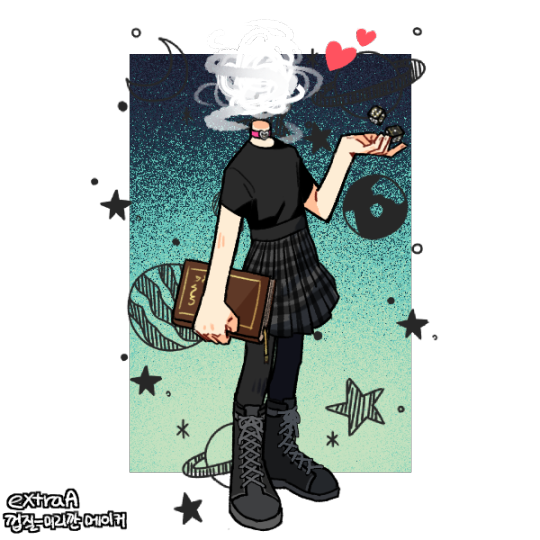

As soon as she discovers it she excitedly tells her family, and is told to pack. She's heading to the Capital! So cool. At the capital she learns of a prophecy-fortold by their Gods, proven to exist but not mean, and copied into multiple books.) Miyakoi is to meet one of the God's Priests, of the goddess of Vision and Sight, (their main one as she granted the people of Hectiine their vision without eyes and kickstarted the world.) and receive a Prophecy book. The priest sends her to earth, just as a scout she's not THAT special. So Miyakoi is caught up on what this means exactly- she is to head to earth, scout out a hero, and come back with the hero through any means necessary. She's not practiced enough to save the world but she still needs to help. One of the older, more trained, men will save the world.
The Prophecy is going to be written properly soon, I'm literally making this up as I go dknsskjdaa,,, but it essentially is about a hero being retrieved from Earth and brought to Hectiine to prepare for battle. The hero and a citizen of Hectiine- no specified characteristics- is to go with the hero to a different planet, Jinahul, to stop an [《?¿?》] from making the planets of the world disappear. The hero must be: Smart, Brave, Loyal, and Human.
The [《?¿?》] Is an 'untranslatable' word the preists decided ot mark as such. The reason this Prophecy is unknown is to stop panic- especially since the God's haven't spoken in decades about anything. The prophecy was told and wirtten in an ancient, barely comrphesnible language. Left to their own devices the priests and Council (I can talk about this world more later too if you want!:D) decided it best to pretend the gods were still active and the Prophecy doesn't exist.
The Prophecy is very vague, but has a lot of words and different translations as every city has a different unique way of writing and the ancient language issue.
So! Miyakoi heads to earth. There she gets some forged documents and struggles to learnt he ways of human life before this """school""" thing starts. She doesn't know what that is and spends an entire weekend catching herself up to be ready for-what she now knows as- grade 8. In her first class, Art, her new favourite she decides, she meets another student. She's the cliche "nice pretty girl with good grades" from what she can tell. She seems like a good enough candidate, so Miyako I tries befriending her. She sees instances of the girl, Sophie Basil Richards she learns is her name, stand up for her friends. She isn't yet confided of Sophie- and consults her copy of the prophecy a lot.

She also meets Jackie. Jackie is a more mischievous student, and definitely a slacker, but still has the qualities of a hero. Miyakoi doesn't have a time limit, so she chooses to observe both Sophie and Jackie. Jackie has a good heart, and they're a nice person after a bit. (Pretend I gave Jackie pupils here for when she's on earth fkjdjsjs)

Miyakoi decides on Jackie. She's seen Jackie defend her friends, never falling to throw a punch when they deem it's needed. Jackie is headstrong and from her observations and excessive note-taking is the perfect candidate. Theyre smart and brave and loyal and they're so lovely it almost hurts. Mind set, Miyakoi sends a note Jackie's way. "south bathroom in 10". There miyakoi will wait and be in her part form. She waits and waits and the door opens, miyakoi turning to see the hero, the one who she'll send home with her-
Clearly distracted, "uh... I was told to meet you here in 10? Uh-"
Sophie.
It was Sophie.
She had walked in. To see this. Floating mass of white glowing tendrils??? Miyakoi shifting looks like her face melting off. So then Sophie sees her friends face reverse-melt off. Sophie freezes, seeing the second half of the shift, and she's frozen in place.
Thus, the adventure starts.
Most of this was world building and stuff- I'M LITERALLY THINKING IT UP AS I WRITE THIS KFNDKENEKDHDIEHEIHE- and it's a LOT bestie. This lives in my mind rent free istg.
13 notes
·
View notes
Text
Translating the Sacred Jedi Texts - Part I
By Ender Smith
Adapted from the original twitter thread
This is the first part of an ongoing Jedi Text Translation series

The Sacred Jedi Texts are ancient writings of the Jedi religion in the world of Star Wars. Though their appearance is limited to just two of the films (The Last Jedi, and The Rise of Skywalker), they are given the thematic weight of representing the entire history of the Jedi religion.
In The Last Jedi, Yoda opines: “Read them, have you? Page turners they were not!”
Likewise, Phil Szostak (Lucasfilm creative art manager) has warned:
“designers don’t have time to add Easter eggs, lore hints or layers of symbolism (outside of the obvious). If you’re searching for hidden meaning in #StarWars art, it’s simply not there.”
Let us keep those thoughts in mind as we begin to explore and translate the Jedi Texts.
Jedi Texts Filler 01 by Dan Burke
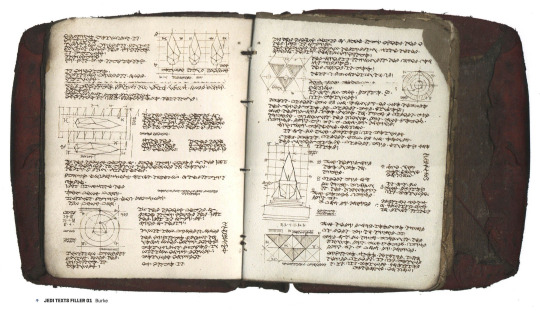
Several unobscured pages of the Sacred Jedi Texts can be seen in The Art of Star Wars: The Rise of Skywalker by Phil Szostak. The pages themselves appear to be assembled from individual blocks of text and illustrations, in order to meet the high demand of pages required for the film.
By cross-referencing these images with the Visual Dictionary, we learn that this language seems to be interchangeably referred to as “Protobesh” and “Coremaic.”
The implied etymology of the name “Coremaic” is that the language comes from the galactic core, the core worlds, or perhaps a specific planet such as Corellia or Coruscant.
“Protobesh“ meanwhile might refer to a precursor/prototypical form of Aurebesh, the most common alphabet in the Old Republic, Imperial, and New Republic eras.
Since many alphabets in Star Wars are simple substitution ciphers for English (equivalent to the in-universe “Basic”), I decided to try an automatic tool to decrypt them. (Boxentriq is my favourite).
After trying various blocks of text, and adjusting the decryption parameters, I was nearly ready to concede that it was untranslatable gibberish, until a single passage caught my attention, from the left-hand page of Jedi Texts Filler 01 by Dan Burke:

I noticed a couple of repeated words, one with 3 letters, and another with 4. After some trial and error, I began to see words resolve throughout the passage:

It reads [sic]:
IN THE SECOND PHASE OF
EACH STAR CYCLE THE JEDI
THE JEDI IS OFFER ED.
ORCE OF THEIR.
While some of the sentences are incomplete, the pendulum had swung entirely the other way, and I was certain it could be translated!
So I turned to the right-hand page to see how accurately I could decipher it.
Translating a Lengthy Passage

There are definitely some new letters mixed in there, but because I had already accounted for over half of the alphabet in the first passage, it was possible to work out the missing letters using context:
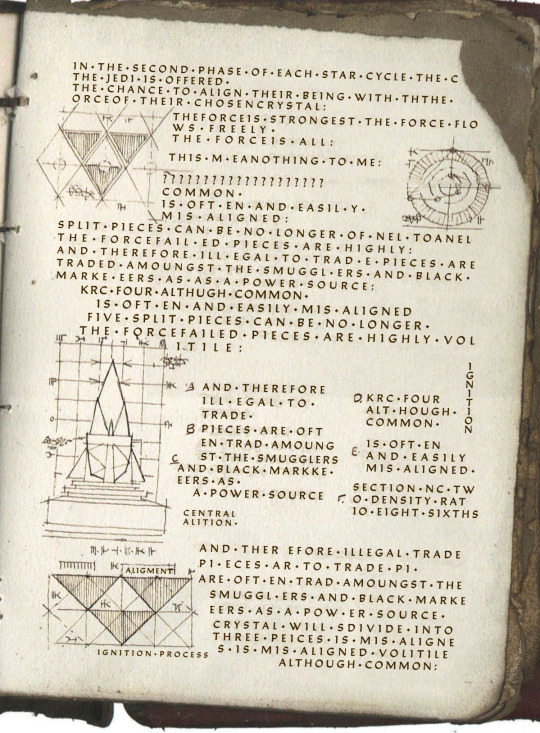
It reads in its entirety [sic]:
IN THE SECOND PHASE OF EACH STAR CYCLE THE C
THE JEDI IS OFFERED
THE CHANCE TO ALIGN THEIR BEING WITH THTHE
ORCEOF THEIR CHOSENCRYSTAL.
THE FORCEIS STRONGEST THE FORCE FLO
WS FREELY
THE FORCE IS ALL.
THIS M EANOTHING TO ME.
[this line is not readable, due to corruption in my source image]
COMMON.
IS OFT EN AND EASIL Y
MIS ALIGNED.
SPLIT PIECES CAN BE NO LONGER OF NEL TOANEL
THE FORCEFAIL ED PIECES ARE HIGHLY.
AND THEREFORE ILL EGAL TO TRAD E PIECES ARE
TRADED AMOUNGST THE SMUGGL ERS AND BLACK
MARKE EERS AS AS A POWER SOURCE.
KRC FOUR ALTHUGH COMMON
IS OFT EN AND EASILY MIS ALIGNED
FIVE SPLIT PIECES CAN BE NO LONGER
THE FORCEFAILED PIECES ARE HIGHLY VOL
ITILE.
A) AND THEREFORE
ILL EGAL TO
TRADE
B) PIECES ARE OFT
EN TRAD AMOUNG
ST THE SMUGGLERS
C) AND BLACK MARKE
EERS AS
A POWER SOURCE
D) KCR FOUR
ALT HOUGH
COMMON
E) IS OFT EN
AND EASILY
MISALIGNED
F) SECTION NC TW
O DENSITY RAT
IO EIGHT SIXTHS
CENTRAL
ALITION
AND THER EFORE ILLEGAL TRADE
PI ECES AR TO TRADE PI
ARE OFT EN TRAD AMOUNGST THE
SMUGGL ERS AND BLACK MARKE
EERS AS A POW ER SOURCE
ALIGNMENT
IGNITION PROCESS
CRYSTAL WILL SDIVIDE INTO
THREE PIECES IS MIS ALIGNE
S IS MIS ALIGNED VOLITILE
ALTHOUGH COMMON.
Making Sense of it All
As you may be able to tell, there are several statements mixed together on this page with varying degrees of coherence.
I have attempted to reconstruct each source-statement as follows:
Regarding a ritual for the spiritual alignment of the crystal with the Jedi’s being:
In the second star cycle, the Jedi is offered the chance to align their being with the Force of their chosen crystal.
The Force is strongest when the Force flows freely. The Force is all.
Regarding the physical alignment of the crystal in the lightsaber:
Central alignment [with an accompanying illustration]
Ignition process [with an accompanying graph]
Section NC-2: Density ratio 8:6
Regarding flawed and damaged crystals:
[Crystals with some particular defect] are often and easily misaligned.
Split pieces can be no longer [functional? useable?].
The Force-failed pieces are highly volatile and therefore illegal to trade.
Pieces are therefore traded amongst the smugglers and black-marketeers as a power source.
Regarding the author’s personal feelings at time of writing:
This means nothing to me.
In Conclusion: Was Yoda Right?
If we take the literal text on the page as canonical, as existing exactly like this in the diegesis of the films, this particular Sacred Text seem to exhibit circular, stream-of-consciousness meditations upon complex scientific, religious, and economic systems. If so, I think we would be justified in agreeing with Yoda that “Page turners they were not.”
As for Phil Szostak’s statement from before, that “designers don’t have time to add Easter eggs, lore hints or layers of symbolism (outside of the obvious). If you’re searching for hidden meaning in #StarWars art, it’s simply not there,” I think it is important that we take it in context.
The concept artists behind Star Wars often do not spend more than a couple of hours on an individual painting. The pressures of the production schedule require artists to work quickly and iteratively. Ideas are thrown out and scrapped at a rapid pace as the story, design, and construction is undertaken.
While these pages are filled with references to kyber crystals and Jedi rituals, there is nothing too profound or complicated discussed. The repetition is the result of quickly copied phrases that are there to fill space and to visually tell a story of the volumes of Jedi texts and the writings they contain. That they contain any lore at all is remarkable, but we must not take that to mean that anything they say is immutable canon.
In other words, take the artist’s words at face-value here: “The Force flows freely. The Force is all. This means nothing to me.”
Resources & Acknowledgements
Here is my Protobesh alphabet chart based on my translations:
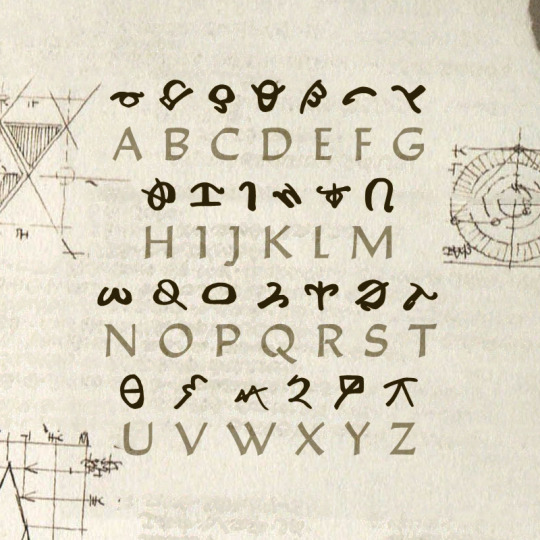
Ender Smith is the editor-in-chief of AurekFonts: the unofficial archive of in-universe Star Wars fonts.
Support future translations and typographic design at ko-fi.com/aurekfonts.
All photos used are the property of Lucasfilm Ltd. They have been used altered and unaltered for educational and critical purposes in accordance with Fair Use law.
#star wars#the last jedi#sacred jedi texts#aurebesh#rise of skywalker#translation#sw-translation#protobesh#coremaic#sjt-translation
46 notes
·
View notes
Text

Two more weeks until Toska!
Preorder here. (Or yr book retailer of choice.)
Here are some very nice things that writers I admire have said about it:
These are poems about the untranslatable but essential concepts that form us, and Alina Pleskova is the interpreter of their simultaneous hold and flight: “What you call me in the dark / isn’t what I am / & that helps me float / above the moment.” Toska is a book of the immigrant daughter in her not-quite-own world, and a book of contempt for striving and capitalism—but the centripetal force that powers these poems is the nameless part of the self, “ruthlessly / down for whatever,” the locked room that nobody can open even while you long for a breach. Pleskova, generous and funny and modern, is a poet of forthright intimacy. —NIINA POLLARI, author of Path of Totality
Alina Pleskova’s debut collection is into grabbing things by the neck, & not always gently: eros in the ancient bedroom & the age of apps; transcendence & complacency & spirituality under capitalism. Pleskova’s poetics is deliciously generous, even in its moments of ambivalence; reading Toska is like chatting with your best friend about pursuing & evading pleasure while the American project unravels. These poems don’t just see to the heart of queer & immigrant subjectivities; they enact them. I sank with this book, was buoyed by this book—how it, like so many of us in America, experiences perpetual attempt, failed translation, the feeling that we are always missing something just beyond our reach. If only we could tighten our grip, want wanting itself, we might unearth language for identity & desire language, of course, being ephemeral, timeless, fleeting, & stunning, all at once. —RAENA SHIRALI, author of summonings and GILT
Alina Pleskova's Toska bears the burden of the eponymous longing melancholy of living even as it phases into the burn of real threats to human-and humane-existence. Writing from "The country where I live- / its surveillance of us surveilled by the country I'm from-" she counterpoints the impersonal gaze of the state and algorithms that follow our movements with the poet's infinitely careful attention to the flow of the everyday: "Made it this far / without mentioning the rain. // Here it is; it's perfect." Solace is found in community, the imperative to "Daydream what mutual care could do," the vast motions astrology tracks, ancient poet gossip. Overwhelmingly, too, in the mysteries of queer desire and its dream of transcendence, the desire to desire unbounded by intolerance, or worse-murder. These poems telegraph in a seductive whisper that keeping each other alive is enough-it's everything, because "I want the class wars to start, but everyone's so tired." The poet asks, "What song was playing when my heart's chambers I got thrown open to let these breezes in?" This book is the song, its frequencies coming through the voices of friends, lovers, family, the poets of the past, and Pleskova's tender plaint that would "Mourn the redwoods, fireflies, platypuses, permafrost, all else that deserves to outlive us & won't ..." In her hands, poetry is the hack for our earthly hangover, toska / saudade its secret sauce in whose ingredients hide the seeds of a new world. We'll be together there,' "covered in each other's hair." —ANA BOZICEVIC, author of New Life
Reading Toska was a spiritual and whole-body experience. I laughed, I screamed, I teared up, I nearly bought a one-way ticket back to Moldova, I called my mom. No one captures the poetics of eros and diasporic longing amid our late-stage capitalist hellscape like Alina Pleskova. 'Assuring various robots / that I'm not a robot several times daily' does not prevent our speaker from 'stockpil[ing] intimacies almost too ephemeral to clock.' And what a gift this book of intimacies is. Toska is a tender and wry instruction manual for navigating desire and the void. I will follow Alina Pleskova anywhere. —RUTH MADIEVSKY, author of All-Night Pharmacy
8 notes
·
View notes
Note
“When a dragon uses a breath attack like fire or frost, it is speaking in an ancient and powerful language. A battle between two dragons is actually a deadly verbal debate.” So are they just like, yelling "FIRE" at eachother? I'd love to know how the dragon language works exactly because arguments/verbal debates normally don't involve yelling about the elements. (I know this sounds sarcastic but I'm genuinely interested!! Dragons are rad)
honestly anon i’m a little out of mind rn to properly go and try and corroborate things but like, pushing aside the fact that dovahzul is a little... weird, i like to think that dragons have this whole language going on that’s not as literal as like. fire. maybe kind of untranslatable because it has like, many different meaning with different contexts and shit. shouting fire can be one thing to a dragon, who’s a natural speaker of dovahzul and another to a human
this is all speculation though
142 notes
·
View notes
Text
I was not technically tagged, but at least two people on my dash were like DO WHAT YOU WANT NO ONE IS YOUR GOD, and you know what? They’re right and valid.
1) How many works do you have on AO3?
96! And 90% of them are from just this year. Can’t wait to find out what the big 100 is gonna be. Any one of my WIPS could be Disney’s next 100th fic.
2) What’s your total AO3 word count?
455,024 (also mostly from this year...)
3) How many fandoms have you written for and what are they?
In my entire life??? Since I was twelve??? I don’t even know, man. I wrote a lot of ooc crackfic and fic for cartoons when I was on FF.net, and then I was on LJ and wrote for a TON of different fandoms, but on AO3, I have written for Critical Role (so much CR), Yashahime/Inuyasha, Guardians of the Galaxy, His Dark Materials (TV), Steven Universe, Bleach, Alias, Supernatural, Dollhouse, Pushing Daisies (the last four were all transferred here from LJ, though)
4) What are your top five fics by kudos?
- turning wine back into water (Critical Role, de-aging fic with plot, 30457 words)
I STILL CANNOT BELIEVE HOW POPULAR THIS FIC IS. It beat out two of my super popular GotG fics that have been up since 2017 BY A LOT. Apparently, there was a market for the Mighty Nein being adorable cocktail brats and saving the world. Thanks, Liam’s Quest!
It is probably one of the most wholesome fics I will ever write too. I love it.
- Sunshine Came Softly (Guardians of the Galaxy, Rocket and Mantis friendship, 3188 words)
THIS FIC STILL GETS HITS EVEN TODAY. It was written right after I saw the movie so it hit hard and fast on the hype train.
- Mine Is Just a Slower Sacrifice (Guardians of the Galaxy, Rocket-centric, 2248 words)
BOY YOU CAN TELL THESE FICS ARE ANCIENT BECAUSE I HADN’T DEVELOPED MY TITLE NICHE YET. where are the lower caps and Seanan McGuire lyrics!!
Anyway, this was written probably IMMEDIATELY after I saw the movie and had to process Rocket’s emotions during the last moments, because of who I am as a person. For what’s mostly a character study, it got some mileage on it.
- they drink dreamers up like brandy (Critical Role, 1625 words)
Back to Critical Role! I wrote this one when I was in a fucking blind post-finale haze and producing massive amounts of Kingsley content and I wanted to write a silly fic about Caleb being tiefling catnip.
- if adversity breeds character (we’ve character enough for two) (Critical Role, Beau and Molly-centric, 1824 words)
I feel like most of my most kudos-ed CR fics are Beau-related, which is funny because I never really wrote her EVER. I guess I need to write her more often. ANYWAY, this one got jossed immediately after 141, but I needed to write Beau and Molly bantering and I couldn’t get her flipping him off after revealing her card is Rumor out of my head.
(Incidentally my sixth most kudos-ed fic is my Fjorester next gen fic, WHICH I WAS NOT EXPECTING AT ALL. IT’S A FIC BASED ON MY OC FANCHILDREN!! I’M VERY EMOTIONAL ABOUT THAT!!)
5) Do you respond to comments, why or why not?
Usually!! There are times when I forget and then it’s been so long that I never go back, but I like responding to comments. They make me so happy and I want to make sure the people who take the time to comment know that I see them and appreciate them. Especially if they give me long comments. You long commenters know who you are and I value you and also flail incoherently in your direction.
6) What’s the fic you’ve written with the angstiest ending?
God, probably this church takes no conversions simply because, like, the whole ending scenes are MISERABLE AND FULL OF ANGST and then it has the hopeful ending that is actually a bullshit lie.
But second place probably goes to what couldn’t i offer, what couldn’t i give, which is just misery porn in disguise as a character study. Sorry, Cree.
7) Do you write crossovers? If so what is the craziest one you’ve written?
Okay, so back in the day when I was a tineh fanbrat I wrote a lot of self-indulgent crossovers featuring my friends and I in true Mary Sue format being ~saviors of the world~ alongside our favorite fictional characters and after I grew out of that, I very rarely did it again, because as someone who can only write AUs if they’re high concept and can only write crossovers if the canon welding is pristine, it’s difficult.
I have ideas for some! I just haven’t written them yet. Or they’re sitting in Google Docs partially written.
8) Have you ever received hate on a fic?
Not to my recollection, which is insane, because I’ve written some things in my youth that deserved it, but also I was a kid, so maybe I definitely did not deserve it. Don’t send hate to kids!!
9) Do you write smut? If so what kind?
The first smut I ever posted on AO3 involved some fucking American Gods flesh horror shit, so that answers your second question.
Basically, yes, but I write smut to facilitate character development in a way that regular story beats can’t, mainly with characters who are in some way deeply fucked up and have unbalanced dynamics.
So basically chances of me writing smut that isn’t Creecien or Lucigast? Very low. (I haven’t written Lucigast smut yet but I will. Inevitably.)
10) Have you ever had a fic stolen?
Not that anyone’s told me, but one time when I was a teenager someone ripped off an entire group messageboard RP I was in and tried to pass it off as a fic they wrote.
11) Have you ever had a fic translated?
Not that anyone’s told me!
12) Have you ever co-written a fic before?
I tried and it did not work out, because of (non-wanky) reasons, but it’s just not something I’d be very good at. I was the kid who wanted to work alone on group projects. I’m bad at group work.
13) What’s your all time favourite ship?
That I’ve WRITTEN??? Because that at least narrows it down significantly. Sesshoumaru/Rin hands down. It’s a good dynamic and they’re fun and sad at the same time.
My self-indulgent ass does also enjoy writing Creecien though. I’m putting it out there because I want it.
14) What’s a WIP you want to finish but don’t think you ever will?
GOD POOR SUPERNOVAS OF ALL SOUND AND LIGHT. THAT FIC COULD’VE BEEN A CONTENDER, but I unfortunately posted it RIGHT BEFORE the White Diamond episodes aired and it became so jossed by canon so fast that I gave up on life with chapter two half finished. I need to delete it but I can’t bring myself to bury my shame.
15) What are your writing strengths?
Dialogue and meta-narrative and character-specific stuff. I go into every story with CHARACTER FIRST mentality, which is how I end up writing so many damn character studies or why my word counts explode. I’m just out here naval gazing because I love character stuff SO MUCH.
I’ve been told I’m good at fight/action scenes too, which... Shocks me, but I think watching and playing a lot of D&D stuff has really improved how I write fighting and action sequences.
16) What are your writing weaknesses?
[whispers] too much naval gaze. dial it back, bitch.
I get really caught up in character stuff and forget to do important things like ADVANCE THE SCENE OR DESCRIBE THE SCENE OR LITERALLY ANYTHING. I also don’t think my prose is all that great, but I’m pretty sure every writer feels that imposter syndrome bullshit, so /waves hands. All I’m saying is I have seen some writers on AO3 who are writing some fucking vivid imagery and stringing flawless sentences together and weaving introspection and description together like beautiful baskets and they are stronger than any US Marine and I salute them and wish to be them.
17) What are your thoughts on writing dialogue in other languages in a fic?
Iiii try not to. There’s times where I want to throw in, like, a little Zemnian for Caleb flair, but I try to stick to things that are either untranslatable (like German compound words), common phrases (like please or come here), or insults/curses/ pet names. Things that I don’t think Google will fucking lie to me about.
18) What was the first fandom you wrote for?
I think it was a Sailor Moon crackfic about Haruka being forced to enter a beauty pageant which was just a blatant rip-off of Ms Congeniality and oh my god was it awful. I don’t even wanna talk about it.
19) What’s your favourite fic you’ve written?
this church takes no conversions, probably BECAUSE it’s my little red-headed stepchild of a fic involving so many things that are just never going to make it popular (backstory fic, fic that is almost 85% headcanon, doesn’t involve popular characters, etc.), but godDAMMIT I love that fic so much. It was fun and I use every bit of that headcanon in almost everything like it’s my job.
shattered stage is a close second, because it was such a crazy concept for a fic that I PULLED OFF SOMEHOW and is this wonderful mix of crazy plot and character and lore and my three favorite tieflings having to work together. And also Jayne Merriweather as the main villain.
A lot of love went into both of those fics and they are my babies. this time next year we’ll see if I add Creedemption and shoot at fate to this list- probably. All of my epic long fics resolve to be my babies because I spent so much time on them, and I have to love them and cherish them because I raised them into gigantic wordy attempts to write a doorstopper.
3 notes
·
View notes